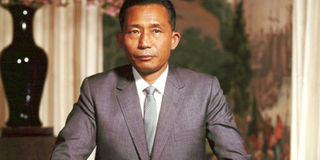Prime
Park Chung Hee: Benevolent dictator who changed South Korea

Former President of South Korea, General Park Chung Hee. PHOTO | FILE
What you need to know:
- The best way to appreciate Park’s legacy is to compare South Korea with nations that faced similar challenges but lacked his leadership. While South Korea’s economy grew more than 700 times since its independence, North Korea’s economy, which followed a vastly different path, increased only 90 times.
One of today’s most debated topics is the role of democracy in a nation’s transformation, especially considering China’s rapid economic rise without democratic structures. The issue holds particular interest for African autocrats, many of whom fail to offer either democracy or genuine economic growth. To shed light on this topic, we examine the transformation of South Korea under General Park Chung Hee, whose dictatorship led to rapid economic transformation.
By 1961, South Korea was in a dire state. Decades of Japanese colonisation, World War II, and the Korean War had devastated the country. The division of Korea left most industries in the north, with the south impoverished and heavily reliant on the US for support of up to 70 percent of its annual budget. South Korea’s political leadership was corrupt and ineffective, often resorting to rigging elections and suppressing the opposition by force. Worse still, the country faced a significant existential threat from the North. It was in this context that Park led a coup in May 1961, promising to bring stability and growth.
Numbering 600,000 people, the Korean army was then an effective fighting force. The experience of the Korean War plus the subsequent security risk had turned it into a formidable war machine. That means it was equipped with managerial and leadership skills that far surpassed those of the civilian government. Park capitalised on this by applying military discipline to civilian governance, a key factor in his ability to supercharge Korea’s economic transformation.
So many things were wrong in Korea and Park had to pick the right priorities to pursue. The intelligentsia wanted economic modernisation – talked about for decades without any implementation. The Americans wanted Korea to remain both capitalist and democratic – the idea of a coup didn’t go so well with them. The people wanted security: history had shown them that they were very weak against foreign aggressors. That said, despite the many competing issues that had to be attended to, Park had one overriding vision that served as a compass: delivering a ‘rich nation and strong army’.
Industrialisation became the driving force behind South Korea’s transformation. Since South Korea didn’t have a sizable market to test local industrial products, an export-led economy became critical to success, and he focused on developing heavy industries such as steel, shipbuilding, and electronics. This strategy was implemented by the chaebols, massive family-owned conglomerates like Samsung and Hyundai, which became the engines of Korea’s economic rise. Park closely followed the Japanese industrial development blueprint, a very sober decision given the scars left by Japanese colonisation in Korea.
Park’s approach to democracy was similarly pragmatic. He did not value Western-style liberal democracy, preferring a system that prioritised efficiency over political competition. While many countries were pushing for democratic reforms, Park believed that Korea needed results rather than endless political debate. He built a system that promoted national unity, eliminated corruption, and focused on getting things done. He purposed to pursue political legitimacy from his ability to deliver rapid economic progress, not from elections or political compromise.
Finally, national security was the backbone of Park’s rule. With North Korea looming as a constant threat and the fear that the U.S. might withdraw its troops, Park knew South Korea had to be ready to defend itself. He pushed for self-sufficiency in weapons production and ensured that South Korea maintained a strong, well-trained military. A secure and stable nation, in Park’s eyes, was a necessary platform for driving an economic agenda.
By the 1970s, as South Korea’s middle class grew, demands for greater political freedom emerged, leading to growing unpopularity for Park’s methods. In 1979, he was assassinated by the head of the Korean Central Intelligence Agency, marking an abrupt end to his rule. Yet, despite the controversy surrounding his style, Park’s legacy has been largely rehabilitated over time. Many Koreans now view him as the greatest leader in the country’s history.
The best way to appreciate Park’s legacy is to compare South Korea with nations that faced similar challenges but lacked his leadership. While South Korea’s economy grew more than 700 times since its independence, North Korea’s economy, which followed a vastly different path, increased only 90 times.
The lesson from Park’s leadership is clear: democracy is not always a prerequisite for economic growth. In fact, autocratic rulers often outperform democracies in the short term by focusing on economic development without the constraints of political competition. However, over the long term, inclusive democratic institutions tend to lead to more sustainable growth, as highlighted by the authors of Why Nations Fail.
In countries such as ours, democracy has been reduced to a shell—stripped of its essence and used only to legitimise incompetence and mask corruption. What we need is not the hollow procedures of democracy, but leadership that prioritises national interests. The South Korean experience demonstrates that results-driven governance is far more effective than endless political bickering. While democracy and strong leadership are not mutually exclusive, a leader focused on action will always outperform one focused on maintaining power through superficial democratic rituals.





